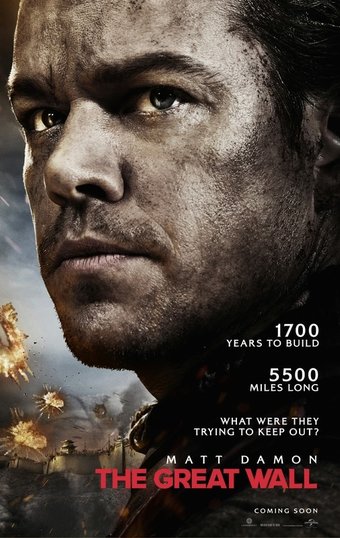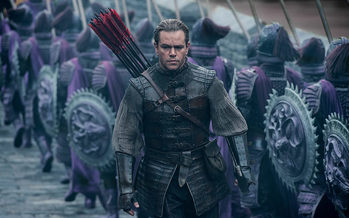Written by Mike CervantesTHIS IS THE EMERGENCY SPOILER ALERT SYSTEM...YOU ARE ADVISED TO READ AT YOUR OWN RISK... When word got out that there was going to be a movie set in ancient China starring Matt Damon, people immediately cried foul. It evokes the especially politically incorrect trope of “the white savior,” one that I personally prefer not to talk about, because it inevitably leads to a conversation about Tom Cruise’s The Last Samurai, and I hate that movie. The studios producing the film, Universal and Legendary, followed up this potential pushback immediately by making the claim this was a China/America co-production. It shows in particular elements in this movie, particularly in the casting. That was enough to bring me to the theater to actually see it, only to notice that the only title cards at the front of the film belong to…Universal and Legendary. Oh well, I guess. Matt Damon plays vaguely Eastern European soldier of fortune William Garin, who was once part of a group of mercenaries seeking to steal the invention of black powder from the Chinese during the Song dynasty. That is, until they’re put slightly off-course by a pack of bandits, and the rest of their group is murdered in the night by a mysterious monster. He and his fellow surviving Spanish counterpart Pero Tovar (Pedro Pascal) soon find themselves at The Great Wall of China, where a group of soldiers called The Nameless Order, immediately arrest them and set them atop the wall just in time for them to witness a siege. Instead of battling Eurasian nomads, these soldiers do battle with the mythical Chinese Tao Tei, usually found engraved on the side of large bronze pots in antiquity, and are depicted here as quadrupedal CG lizard creatures that exist as part of a hive mind that kill humans and feed their remains to a Queen that commands using echolocation. (it’s an odd choice to take a real, accountable part of history and just…replace one side of it with H.R. Giger-esque CG critters, but, oh well I guess…) William and Pero inevitably break loose of their bonds and join in the fight, earning the respect of the Chinese soldiers, but are still treated with distrust, and for good reason, because they still intend to steal black powder from the soldiers with the additional aid of English prisoner Sir Ballard (Willem Dafoe).  In determining what culture the writers of this film were on the side of, you may first notice the way these two groups are depicted. Matt, Pedro, Willem’s characters are shown to be dirty, greedy, and all too willing to turn their backs on their Chinese hosts to get their hand on the deadly weapon in their possession. The Chinese soldiers on the other hand, all played by prominent Hong Kong film actors like Andy Lau, Zhang Hanyu, and Ryan Zheng, are sophisticated, respectful, honorable, and possess technologies that are so advanced, they probably out-steampunk what might have actually existed in the Song period. In battling the Tao Tei they’ve invented things like giant iron spike-balls that they light on fire before catapulting them forward, arrows with bamboo shoots that whistle when a wounded enemy comes near, and a whole platoon of female soldiers that bungee jump off the side of the wall to stick monsters with spears at the bottom. That’s right; this movie has actually militarized the Chinese cinema standard of Wire-Fu. So, Matt Damon is certainly not being treated explicitly as the white savior, here. It is more like he’s the especially impressive Dungeons and Dragons import character. He further grows in the ranks of the soldiers because he is (a) really good with a bow and (b) just happens to be carrying around a large natural magnet that somehow interferes with the Tao Tei’s hive-mind. As the film proceeds, the question of theming continues to be a headscratcher: William himself succeeds because of his ideas of primeval exceptionalism. At one point he’s seen breaking apart a sophisticated Chinese crossbow, just to steal the bow part and shoot in a way that’s familiar to him. Philosophically, however, he’s at a disadvantage, and it becomes up to the film’s female lead character Commander Lin Mae (Jing Tian) to help him understand Eastern compassion. This ultimately becomes a film that moves from set piece to set piece, introduces its themes as individual, single-serving, dim sums and lets the viewer ultimately decide which of these filmmaking concepts is king. You might have already guessed that Pero and Ballard attempt to steal the powder, and a reborn version of William attempts to stop them. Then there’s a whole subplot involving a low-ranking soldier named Shen (Ryan Zheng), which I won’t spoil for you, but concludes with a moral ambiguity that you probably wouldn’t want to see if you understand the reasons that a Great Wall really exists. There are just a lot of odd choices made here, and you’ll spend the run of the film scratching your head just as often as you’ll find yourself impressed with the themes created in this little tabletop fictional version of China. Eventually you’ll walk out of the theater holding your own opinion as the only one that matters, and my opinion won’t be of any help, because my opinion is….meh.
0 Comments
Leave a Reply. |
Archives
March 2025
|
|
© 2012-2025, Nerds That Geek LLC.
All Rights Reserved. |
uWeb Hosting by FatCow


 RSS Feed
RSS Feed